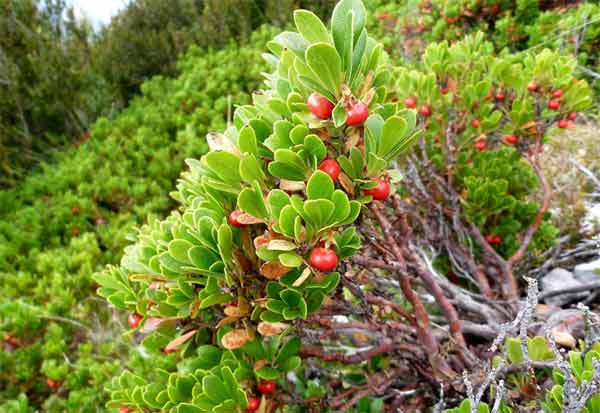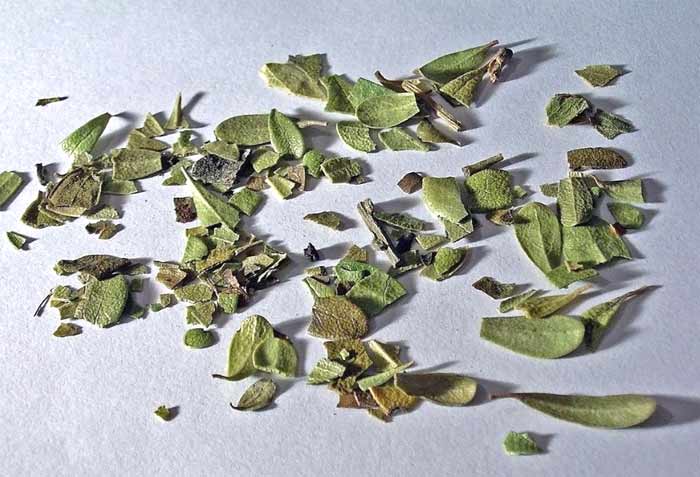Uva-Ursi in herbal medicine

Uva-Ursi (Arctostaphylos Uva-Ursi) is also known as bearberry, bear grape, mountain cranberry, and chipmunk's apple. Leaves of the plant are used to treat chronic bladder infections.
Uva-Ursi is used to reduce urinary pain and to produce diuretic effects. Add to teas and tonics when treating weakened kidneys, the liver, the pancreas, and other internal organs.
Uva-Ursi soothes irritation and reduces inflammation in the whole urinary tract.

Uva-Ursi is used in herbal medicine to soothe irritation, reduce inflammation, and fight infection.
Uva-Ursi leaves are extremely antiseptic and very effective in treating acidic urine. Uva-Ursi leaves are also used to treat kidney stones and are helpful in cases of chronic diarrhea.
Uva-Ursi acts on the mucus membranes of the urinary tract to soothe irritation, reduce inflammation, and fight infection.
Uva-Ursi berries and leaves are a diuretic.
Uva-Ursi berries and leaves increase urine flow, reduce bloating, and reduce water retention. They are very useful in the treatment of edema.
In herbal medicine, the leaves are used more than the berries.
Science, uva ursi, and healing
Uva ursi extract has been used in American Indian medicine for centuries. Uva ursi contains hydroquinone, arbutin, and methyl arbutin which have anti-inflammatory and antiseptic properties.
Uva-ursi is approved for use in urinary tract inflammation by the German Federal Institute for Drugs and is available by prescription. Uva-ursi contains powerful flavonoids that work to fight urinary pathogens. More studies are currently underway.
More about Uva-Ursi
High amounts of the chemical compound, glycoside arbutin, are present in Uva-Ursi. This substance kills bacteria in urine.
Before it can act, however, the urine must be alkaline. To ensure alkaline urine, drink 6 to 8 grams of sodium bicarbonate (baking soda) mixed with water.
Uva-Ursi works best when you don't take it with fruit juice, tomatoes, pineapple, foods rich in vitamin C, or vitamin C supplements.
Other uses for Uva-Ursi
Uva-Ursi tea or tincture is sometimes used in treating bed wetting and has been reported to be effective against E. coli bacteria.
Uva-Ursi is also used externally as an astringent wash for cuts and scrapes.
Uva-Ursi and other cultures
American Indians not only use Uva-Ursi as a medicinal herb for treating urinary infections, they also combine Uva-Ursi with tobacco for smoking.
In Russia, Uva-Ursi is used as a beverage.
In Scandinavia, the leaves are sometimes used to tan leather (because of the high tannin content).

Dried Uva-Ursi leaves should be collected in the fall
Harvest leaves in September or October. The berries are edible but sour tasting. They can be used as a survival food in extreme situations.
After harvesting uva-ursi leaves, they should be dried completely, then stored in air-tight containers for use in winter months.
A native of cold, northern regions, uva-ursi is an evergreen ground-cover with red berries.
The plant thrives in humus-rich, acid soil.
Bears are very fond of the berries and they are also a major food source for grouse. Cattle usually avoid the plant.
Uva-Ursi plants
Uva-Ursi is sometimes grown as an ornamental plant. It is very attractive when cascading over walls and embankments.
Uva-Ursi has small, pink, bell-shaped flowers that mature into red berries. The leaves are dark green, spatula shaped, and leathery.
Uva-Ursi can be grown in pots and makes an attractive plant beside patios and along walkways.
*Use Uva-Ursi for only one or two weeks at a time. Do not use Uva-Ursi if you have been diagnosed with kidney disease or high blood pressure without consulting with your doctor.
Uva-Ursi can irritate the stomach. If you experience stomach discomfort, discontinue use.
Uva-Ursi is not recommended for children under twelve years of age. Do not use during pregnancy. Studies indicate that uva-ursi may increase the anti-inflammatory effects of corticosteroid medications including ibuprofen.
Always consult with a physician before using any herbal remedy.
Sources:
https://www.ncbi.nlm.nih.gov/books/NBK556475/
https://www.ncbi.nlm.nih.gov/pmc/articles/PMC5591533/
Blessings to you and yours!
Thanks so much for reading my blog. Jan.

*Note - the information on this website has not been evaluated by the Food and Drug Administration.
© 2005-2024 website design and content by Janice Boling